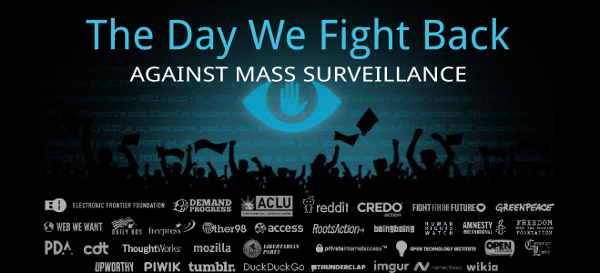3 things to do on The Day We Fight Back
This Tuesday is a day to fight back against mass surveillance of communications.

Mass surveillance is a huge problem, as shown by the Snowden revelations on the communications interception activities of the US’ NSA and the UK’s GCHQ. Governments are spying on us all, endangering the very fabric of democracy. Corporations are asking us to give away our privacy for a little convenience with much the same effect.
Furthermore, mass surveillance is a hard problem to solve since we are essentially up against a very human fear of dangers hidden somewhere in the dark and we’re being told that surveillance will protect us from those dangers.
However, surveillance not only fails at protecting us, it also makes everyone worse off in the long run.
Here are 3 simple ways to do to counter the pervasiveness of surveillance.
- Make your web browsing more secure by installing the HTTPS Everywhere extension in your browser. This will make it much harder for potential snoopers to intercept your connection with the web sites you look at, and will help to protect any data you send there.
- Generate a GPG key, and start using it to encrypt your data, especially your email. (There’s help on the web.)
- Write to one or more of your political representatives. Explain that you are deeply concerned about mass surveillance, and ask them to help end the practice. Be polite, brief and clear.
By so doing, you have not only made yourself a little more secure, but have also helped others to improve their privacy and have contributed to driving political change.



